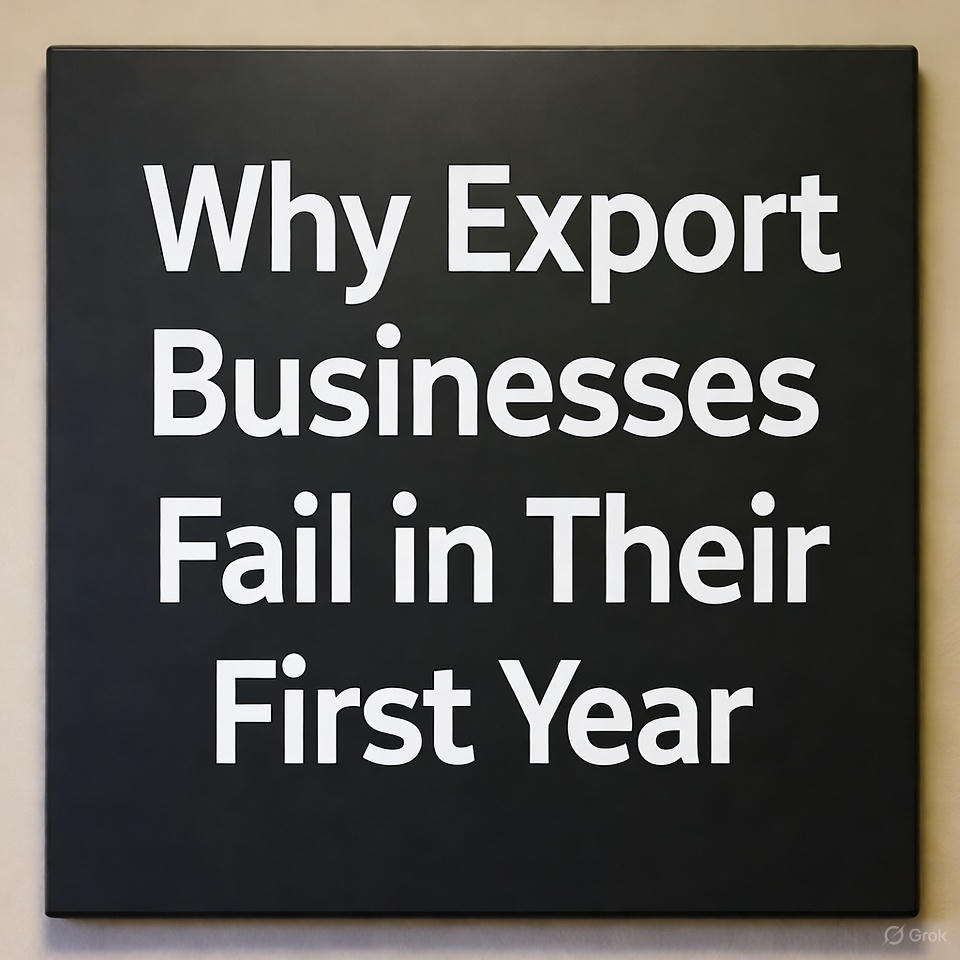Starting an export business sounds straightforward.
Find a product. Find a market. Ship it overseas. Make money.
But the reality? Most export businesses don’t make it past 12 months. They run out of cash, lose shipments, or drown in paperwork they didn’t see coming.
The good news is that most of these failures are avoidable. The mistakes are predictable. And if you know what to watch for, you can sidestep the traps that catch everyone else.
Underestimating the Cost of Logistics
This is the big one.
New exporters look at the product cost and the sale price, then assume everything in between is minor. It’s not. Shipping, customs, insurance, and handling can eat 30% to 40% of your margin before you’ve even invoiced the customer.
International Forwarding services handle the entire process, from pallet collection to customs clearance to final delivery. But if you don’t budget for it properly from day one, you’ll be underwater before your first container arrives.
Get quotes early. Factor in fuel surcharges, peak season rates, and currency fluctuations. Then add 15% as a buffer. Logistics costs always creep up.
Choosing the Wrong Markets
Just because a product sells well in the UK doesn’t mean it will sell in Germany, France, or Spain.
Market research matters. You need to understand local demand, competition, pricing, and regulations. Some countries have strict import rules for certain products. Others have high tariffs that kill your price advantage.
New exporters often target markets based on gut feel or because a friend said it would work. That’s not a strategy. Use trade data, speak to distributors, and test demand before you commit.
According to the Department for Business and Trade, businesses that conduct proper market research before exporting are three times more likely to succeed in their first year.
Start small. One country. One product line. Prove the model before scaling.
Ignoring Customs and Compliance
Customs paperwork stops more shipments than anything else.
Every country has different rules. Some require certificates of origin. Others need health and safety documentation. If your paperwork is wrong or incomplete, your goods get held at the border. And while they sit there, you’re paying storage fees.
Customs brokers exist for a reason. They know the rules, they file correctly, and they keep your shipments moving. Trying to do it yourself to save a few quid usually costs more in delays and penalties.
Learn the basics, but don’t try to be an expert. Partner with someone who does this every day.
Poor Cash Flow Management
Export payments take time.
You might wait 30, 60, or even 90 days to get paid. Meanwhile, you’ve already paid your supplier, your freight forwarder, and your customs broker. That gap kills businesses.
Letters of credit help, but they’re complex and expensive. Trade finance exists, but it’s not always accessible for startups. The simplest solution is to negotiate shorter payment terms or ask for deposits upfront.
If you can’t afford to wait 60 days for payment, don’t offer those terms. It’s better to lose a customer than lose your business.
Picking the Wrong Freight Partners
Not all freight forwarders are the same.
Some specialise in air freight, others in sea. Some have strong European networks, others focus on Asia. If you’re shipping pallets to Germany every week, you need a forwarder with reliable road freight routes and fast customs clearance.
Price matters, but reliability matters more. A cheap forwarder who misses delivery windows or loses paperwork will cost you customers. A slightly more expensive partner who delivers on time and solves problems is worth every penny.
Check reviews. Ask for references. Test them with a small shipment before you commit to a long-term relationship.
Failing to Protect Against Currency Risk
Currency moves.
You quote a price in euros today, and by the time you get paid in three months, the exchange rate has shifted. Suddenly, your margin has disappeared.
Forward contracts lock in exchange rates so you know exactly what you’ll receive. They’re not complicated, and most banks offer them. If you’re exporting regularly, use them.
Even small currency swings add up over time. Protect your pricing and protect your profit.
Overlooking Insurance
Goods get lost. Containers get damaged. Trucks crash.
It happens more than you think. And if you’re not insured, you’re absorbing the full loss.
Transit insurance costs a fraction of your shipment value, but it covers you if something goes wrong. Don’t assume your freight forwarder’s insurance is enough. It often caps at £50 per consignment unless you pay extra.
Read the policy. Understand what’s covered. Then decide if you need additional protection.
Not Understanding Incoterms
Incoterms define who pays for what and who takes responsibility at each stage of the shipment.
Get them wrong, and you’ll end up paying for costs you thought the buyer was covering. Or worse, the buyer refuses delivery because they didn’t expect to pay import duties.
Common terms like FOB, CIF, and DDP all mean different things. Learn them. Use them correctly in contracts. And make sure your customer understands them too.
According to the International Chamber of Commerce, misunderstandings over Incoterms are one of the top causes of disputes in international trade.
Clarify responsibilities upfront. Put it in writing. Avoid surprises.
Trying to Do Everything Alone
Export businesses are complex.
You need to manage suppliers, logistics, customs, payments, and customers, often across multiple time zones. Trying to do it all yourself leads to mistakes, burnout, and failure.
Delegate. Hire a logistics partner. Use a customs broker. Outsource bookkeeping. Focus on what you do best, and let specialists handle the rest.
The businesses that survive aren’t the ones doing everything themselves. They’re the ones building a team of reliable partners who can handle the details.
Ignoring the Importance of Documentation
Every export shipment needs documentation.
Commercial invoices, packing lists, certificates of origin, bills of lading. Miss one, and your shipment gets delayed. Get one wrong, and you face fines.
Set up templates. Create checklists. Double-check everything before you send it. Small errors cause big problems.
Digital tools help. Many freight forwarders offer online portals where you can upload documents and track progress. Use them. They reduce mistakes and save time.
Underpricing to Win Customers
Competing on price is tempting, especially when you’re starting out.
But if your prices are too low, you can’t afford the unexpected costs that always come up. A customs delay. A damaged pallet. A currency swing. Suddenly, you’re selling at a loss.
Price for sustainability, not just to win the first order. Factor in all costs, including your time. Then add a margin that lets you absorb problems without going under.
Customers who only buy on price aren’t loyal customers. They’ll leave as soon as someone cheaper comes along. Focus on value, service, and reliability instead.
Not Planning for Returns and Disputes
Things go wrong.
Products arrive damaged. Orders get mixed up. Customers change their minds. If you don’t have a process for handling returns, you’ll lose money and damage your reputation.
Who pays for return shipping? Who handles customs on the way back? How do refunds work? Sort this out before you make your first sale.
Clear return policies protect you and build trust with customers. Don’t leave it to chance.
Failing to Build Relationships
Export is relationship business.
Your freight forwarder, your customs broker, your distributors. These relationships matter. If you’re easy to work with and pay on time, people will go out of their way to help when things get tight.
Pick up the phone. Say thank you. Treat people well. It pays off when you need a favour or when something goes wrong.
Good relationships also lead to better rates, priority service, and insider knowledge that can save you time and money.
Expanding Too Fast
Success in one market doesn’t mean you’re ready for three more.
Scaling before you’ve sorted out logistics, cash flow, and processes is a recipe for disaster. Each new market adds complexity. More suppliers. More shipping routes. More regulations.
Nail one market first. Get profitable. Build systems that work. Then expand carefully, one step at a time.
Slow growth is sustainable growth.
Not Tracking Performance
You can’t improve what you don’t measure.
Track delivery times, shipping costs, customer complaints, and profit margins. Look for patterns. If one shipping route is always delayed, find an alternative. If one market isn’t profitable, cut it.
Most export businesses fail because they don’t know their numbers. They guess. They assume. They hope.
Hope isn’t a strategy. Data is.
The Path Forward
Export businesses fail because they underestimate complexity, ignore cash flow, and try to cut corners on logistics and compliance.
But the businesses that make it? They plan properly, build reliable partnerships, and focus on sustainable growth.
You don’t need to be perfect. You just need to avoid the obvious mistakes. Budget for logistics. Research your markets. Use specialists where it matters. And always, always manage your cash flow.
Do that, and you’ll be in the minority that makes it past year one.






